About Manu Smriti
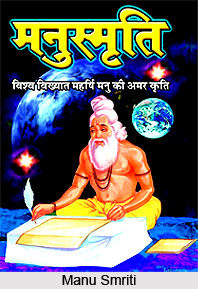 Manu Smriti, also known as the Manava Dharmasastra, is one of the nineteen Dharma sastras which belongs to the Smriti literature. Considered to be the oldest and one of the most important texts of this genre; `Manusmriti` is a `Dharmasastra` of Hindu Dharma, containing the foundational work of Hindu law and ancient Indian society. It is one of the oldest and important of the `Smritis`. `Manusmriti` contains the laws (conduct in life), which is needed to follow in various orders of life and by persons of various `varnas`. `Smritis` mean, "Those which has to be remembered".
Manu Smriti, also known as the Manava Dharmasastra, is one of the nineteen Dharma sastras which belongs to the Smriti literature. Considered to be the oldest and one of the most important texts of this genre; `Manusmriti` is a `Dharmasastra` of Hindu Dharma, containing the foundational work of Hindu law and ancient Indian society. It is one of the oldest and important of the `Smritis`. `Manusmriti` contains the laws (conduct in life), which is needed to follow in various orders of life and by persons of various `varnas`. `Smritis` mean, "Those which has to be remembered".
Also known as Manav Dharam Shastra, Manu Samhita thrives to be the earliest metrical work on Brahminical Dharma in Hinduism. Hindu mythology states, the Manusmriti is the word of Brahma, shadowing authoritative incantations of dharma. Using the eponym `Manu`, it has been presumed that he created this book, which has led the text to be coupled by Hindus with the first human being and the first king in the Indian tradition.
Manusmriti is one of the 18 `Smritis`. Manusmriti was written at time period when Brahman tradition was in serious threat by the non-Vedic movements. `Manusmriti` was highly criticised and was attacked many times by the colonial scholars, modern liberals, Hindu reformists, Dalit advocates, feminists and Marxists. The Bhagavad Gita contradicted many statements of `Manusmriti`. It is also supposed to have supported Brahmanas like in case of getting concessions in fines and punishments.
There are 2,684 verses divided into twelve chapters and some of these codes of conduct pertain to the Hindu caste system. These chapters discuss the stages of life for "twice-born" males. It explains itself as a discourse given by Sage Manu to rishis who begged him to enlighten them on the topic. Historical sources say that the composition of the texts dates between 200BC and 200CE.
The Manu Smriti is an exemplary treatise on dharma .It is considered such an important source of Hindu law and custom throughout the subcontinent that it was one of the earliest texts earmarked by the British for translation to be used in British courts in India.
Manusmriti shows the obvious influence of Dharma sutras and Arthashastra compositions. Manu Smriti was the first to adopt the term vyavahara padas. This original narrative was divided into twelve chapters and is written in simple verse. The table of contents include the Origin of the World, Sources of the Law, and Dharma of the Four Social Classes.
The Manu Smriti is written with a focus on dharma. It seems that the book was written in a manner which was aware of the dangers facing the Brahmin community during a time of social turmoil.
Contents of Manu Smriti
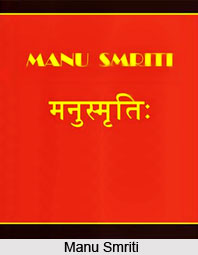 Contents of Manu Smriti are written in a dialogue form that takes place between Manu`s disciple, Bhrigu and his own students. The story commences with Manu giving a detailed description about the creation of the world and the society within it that is divided into four social classes. The rest of the teachings are carry forwarded by Manu.
Contents of Manu Smriti are written in a dialogue form that takes place between Manu`s disciple, Bhrigu and his own students. The story commences with Manu giving a detailed description about the creation of the world and the society within it that is divided into four social classes. The rest of the teachings are carry forwarded by Manu.
Book i contain semi-philosophical account of creation as well as include the essential doctrine of the three constituents of nature. In book ii the sources of law and the duties of students are mentioned. From Book iii-v the householder is the centre of description; his marriage, daily rites and funeral offerings, occupation and general rules of life, lawful and forbidden food, impurity and purification and rules pertaining to women. In Book vi two further stages of life are dealt with: the recluse in the forest and the ascetic. In vii the duties of the king including general political maxims are mentioned. In viii and ix civil and criminal laws are dealt with that also includes the procedure and evidence especially about the ordeals. The revival of debts ; deposit; sale without ownership; partnership concerns; subtraction of gifts; non-payment of wages ; non-performance of agreement; masters and herdsmen ; dispute regarding boundaries ; offence ; assault and hurt; theft; violence; adultery ; duties of husband and wife ; inheritance and partition; gambling and wagers are all spoken about.
Book ix speaks of the duties of kings and of those of Vaishyas and Shudras. In x it is spoken on mixed castes. The rules regarding occupation affect the castes and occupation in time of distress. In Book xi there find rules for gifts and sacrifices and penances. In xii how the sinner pays for his sins are mentioned and counsel regarding the means of attaining release is also spoken about.
There is lack of individuality in the work. The hand of a narrow religion is also prevalent. One can clearly make out the failure to evolve any clear plan. It is also in complete agreement with Indian thought. Some progress is visible that is derived from the law schools in the classification of the topics of law. Rationalism was foreign to the spirit of the writer. His command of language, sincerity, happy similes, carefully handled metre which almost approaches the standard of correctness of the classical poets as well as preserves some touch of epic variety.
Caste laws in Manu Smriti
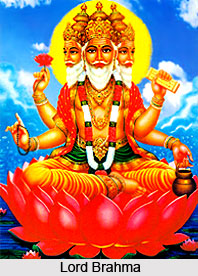 The caste Laws in Manu Smriti claims a divine origin and codifies some of the laws of the Hindu caste system. The rigidity in the caste system is one of the main features of the caste laws. The divine order of caste as prescribed:
The caste Laws in Manu Smriti claims a divine origin and codifies some of the laws of the Hindu caste system. The rigidity in the caste system is one of the main features of the caste laws. The divine order of caste as prescribed:
1. The Brahmin came from the mouth of Lord Brahma.
2. Kshatriya issued from the arms of Brahma.
3. The Vaishya comes from the thighs.
4. The Shudra comes from Brahma`s feet.
The divine rights of the kings have been emphasized. A Brahmin is considered the most superior and by virtue of his birth he was created with special reference to his position as the leader of humanity. As he was sprung from the mouth of Lord Brahma possessing the Veda, he is the Lord of this whole creation. Even when Brahmins employ themselves in inferior occupations they must be honored. His teachings must be accepted by everyone as flawless. It is also considered that he possessed power which is in harmony with his divine position and character.
Kshatriya or military caste is ranked the second best in position and influence. They introduced the skepticisms of philosophical speculation. The Brahmins and Kshatriyas compromised on the fact that they should rule over the lower classes. The Vaishyas or the rural class occupies the third position. They along with Brahmins, Kshatriyas and Vaishyas claim to be twice born. The Shudras or the servile class is ranked the lowest. They are not supposed to intermarry with a superior caste. All the roles of caste are sacred therefore the man who dresses hair cannot clean clothes; neither a table waiter can be persuaded to carry an umbrella.
Criminal Laws of Manu Smriti
The civil and religious code has been strangely combined in the Criminal laws of Manu Smriti<. It seems to be at times that the criminal seems to be under the jurisdiction of a purely civil law. However the guilty is threatened with the most terrible punishments in various forms. It has been observed by legal experts that those punishments were cruel mutilations which were shocking to humanity. The three most prominent features of penal laws in Manu were discrepancy, severity, and a belief that justice is awarded.
It has been mentioned that if a man of low caste injures a superior then he should be mutilated then and there. An inferior abusing a superior must have his tongue cut. If he mentions their name and caste in an insulting manner then a red-hot iron spike should be thrust into his mouth. Those who commit theft should have their hands cut off thereafter which it needs to be pierced on a sharp stick. A goldsmith who cheats should have his body cut to pieces with razors.
Women Rights in Manu Smriti
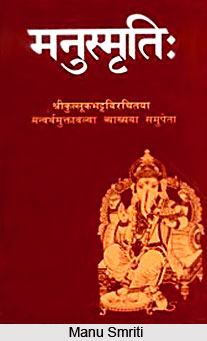 Women Rights in Manu Smriti reveal the efforts of the elite caste in restricting legal independence of the women in that period. The code prescribes that she should be completely subordinated to the will of the lord of the house. However, great respect is paid to the mother by her children. It was advocated that women must be made to feel their dependence on their husbands. However, if they are fond of worldly amusements they should be allowed to follow their own fondness.
Women Rights in Manu Smriti reveal the efforts of the elite caste in restricting legal independence of the women in that period. The code prescribes that she should be completely subordinated to the will of the lord of the house. However, great respect is paid to the mother by her children. It was advocated that women must be made to feel their dependence on their husbands. However, if they are fond of worldly amusements they should be allowed to follow their own fondness.
Laws of Manu are considered as anti-feminist in nature. These laws deprived woman of her religious rights and a spiritual life. The women who belonged to the caste of Shudras were not allowed to read the Vedas. It was even told that a woman could never attain heaven by her own merit. She could not perform a sacrifice on her own. Her only way to reach heaven was through implicit obedience to her husband. She was basically denied any kind of spiritual and intellectual nourishment. These laws elaborated the myth that all women were sinful and are prone to do evil activities. The want of a suitor alone is responsible for a woman`s chastity. Therefore it has been prescribed that she should be kept under constant vigilance. The best way to do it was to keep her occupied in the tasks of motherhood and domestic duties. Manu`s Code of Laws had an influence on the social attitude towards women.
Certain laws of Manu in respect to women are:
* "In childhood a female must be subject to her father, in youth to her husband, and when her lord is dead, to her sons; a woman must never be independent."
* "Women do not care for beauty, nor is their attention fixed on age; they give themselves to the handsome as well as to the ugly just for the fact that he is a man."
* "A husband should be worshiped as a God."
* "Even in the home nothing should be done by a child, a young or even an old woman independently."
* "A wife, a son, and a slave, these three are declared to have no property. The wealth which they earn is acquired for him to whom they belong."
* "Women must particularly be guarded against evil inclinations, however trifling they may appear to be; for, if they are not guarded, they will bring sorrow on both the families. Considering it the highest duty of all castes, even wealthy husbands must strive to guard their wives....lest the seed of others be sown on your soil."
* "It is the nature of women to seduce men in this world, for that reason the wise never remain unguarded in the company of female."
* "A wife cannot be dismissed from the marriage by a slave, separation or abdication."
"A man can leave a barren woman after eight years and one who only gives birth to daughters."
Marriage ceremonial laws in Manu Smriti
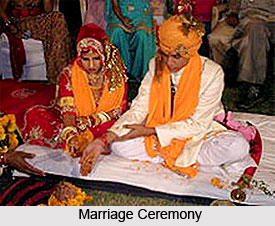 Marriage ceremonial laws in Manu Smriti denote that marriage is a religious duty that completes the purification and regeneration of the superior castes. A man of this caste receives clear directions in regards to a wife`s choice. It is said that the groom should not marry a girl with reddish hair, nor one with excess limbs, nor one who is sick, nor one with too little or too much hair; nor one who speaks a lot and nor one who is red-eyed.
Marriage ceremonial laws in Manu Smriti denote that marriage is a religious duty that completes the purification and regeneration of the superior castes. A man of this caste receives clear directions in regards to a wife`s choice. It is said that the groom should not marry a girl with reddish hair, nor one with excess limbs, nor one who is sick, nor one with too little or too much hair; nor one who speaks a lot and nor one who is red-eyed.
Others don`ts include one named after a constellation, a tree, or a river; a barbarous name, mountain`s name, a bird, a snake, a slave, or any frightful object should not be married. He can marry a woman without defective or deformed limbs, have a pleasing name, whose walks like a flamingo or elephant, whose teeth and hair are moderate and whose body is soft. Evidently the marriage rites in Manu Smriti are taken from older works.
The bridegroom offers an oblation standing who faces the west and takes hold of the bride`s hands, while she sits and faces the east. He chants a few verses and leads her around and makes her mount the mill-stone. After spreading melted butter on the joined palms the bride`s brother scatters parched grains of rice on them twice. After pouring the melted butter into the fire some Vedic verses are recited. The bride thereafter loosens her plaited hair-one on each side of the top of the bride`s head and repeats the Vedic verses. Then bringing their heads together, one sprinkles them with water from the jar. That night the groom should remain in the house of an old Brahman woman whose husband and children are alive. When the bride sees the polar star she says `May my husband live, and may I obtain children.` When the marriage ceremonies have been completed by him, he should give the bride`s dress to one who knows the Surya-sukta and provide food to the Brahmans. They should bless him as well.
After the completion of the ceremony the bridegroom enters upon the endless round of ceremonies. There are five chapters dedicated to domestic ceremonies in regards to birth and treatment of children and so on.
Funeral Ceremonies in Manu Smriti
Funeral ceremonies in Manu Smriti were derived from the Grihya Sutras. These laws are generally considered as one of the most sacred portions of Sanskrit literature. It presents an early picture of the moral and intellectual condition of the people. It also illustrates the strictness with which the pastoral class enforced the rules of caste and their own superiority. These laws are a compilation of rules which has been handed down orally for many generations and were at last gathered and arranged in a systematic collection. However it had quickly attained a position where these laws were considered perfect.
Clear directions have been given in regards to washing o the body, the trimming of the nails, hair and beard. A piece of ground must be dug southeast or southwest of the place where the man resided and died. The burning and burying ground should not be kept closed, instead should be open on all sides. It needs to be rich in shrubs especially in thorny and milky plants. It has to elevated in such a manner that water can run down on each and every side.
If the departed happened to die in the midst of a sacrifice, his relations need to take his three sacred fires and implements and carry them to the place where he would be cremated. The old men follow behind, without their wives, carrying the corpse. However in some places the corpse is carried on a wheel cart, drawn by an ox or any other animal. This animal is to be killed and strewn over the corpse and burned along with it. After the procession has reached the ground, the person who would perform the rites walks three steps around the place towards the left, sprinkles it with water from the branch of a tree and chants a verse from the Veda.
The fires are placed on the borders of a pit. The dead body needs to be placed with its feet toward the Garhapatya fire and the head towards the Ahavaniya fire. Here again it is believed that if the Ahavaniya fire reaches the dead man first, his spirit is borne to heaven. If the Garhapatya fire reaches him first, then his spirit would go to the middle region. If the Dakshina fire reaches him first then it remains in the world of mortals. If all three fires reach him at the same time, it is considered as the most auspicious omen of all. The wooden pile is laid in the midst of these fires. Sacrificial grass is then strewn upon the pile thereafter which the skin and the fur of a black antelope is placed over it.
The wife lies down to the north of her husband. If he is a Kshatriya a bone is also placed there. If the wife is not to be sacrificed, she is led away and the animal is brought. Animal`s fat is cut out and put like a cover over the face of the dead. Some verses from the Rig-veda are recited during that time. Animal`s heart is laid on the heart of the corpse, and after some rites are conducted, the antelope skin is covered over the whole and various oblations are offered. Thereafter fire is lighted and they walk away without looking back reciting a Vedic verse. The ashes and bones are buried and again the process of purification is undergone.



















